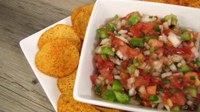Prairie Fare: What’s Your Game Plan for Food Safety on Game Day?
(Click an image below to view a high-resolution image that can be downloaded)
By Julie Garden-Robinson, Food and Nutrition Specialist
NDSU Extension
The Super Bowl is just around the corner.
Game day usually includes bowls and platters of food to serve family and friends. In fact, the Super Bowl is the second largest day for food consumption after Thanksgiving.
In other words, the day usually involves a lot of chips and various dips, chicken wings, soup and an assortment of finger foods.
Do you have a game plan for food safety? Try these seven questions. Just as the number of points determines the winner of the game, all of these questions have numerical answers. The information is based on U.S. Department of Agriculture recommendations.
Question 1: Handwashing always is an important step to food safety. What is the minimum amount of time that you should you wash your hands with warm, soapy water? a. 10 seconds b. 20 seconds c. 30 seconds
Questions 2: Checking the accuracy of your food thermometer is an important first step. After making an ice slush (50/50 crushed ice and cold water), place the thermometer in the ice slush and wait a short time for the thermometer to stabilize. What temperature should the thermometer read? a. 32 F b. 40 F c. 45 F
Question 3: You decide to make chicken wings. To what internal temperature should chicken and other poultry reach? a. 145 F b. 165 F c. 185 F
Question 4: You decide to fire up the grill in your backyard. (Note: You might have to clear snow first in the Midwest.) To what internal temperature should beef patties reach on the grill? a. 160 F b. 170 F c. 180 F
Question 5: You have cut up some fresh fruit, including cantaloupe and watermelon. How long can cut fruit safely be held at room temperature (about 70 F)? a. 30 minutes b. 1 hour c. 2 hours
Question 6: You decide to use your oven to hold cooked food hot until your guests arrive. To what temperature should you set your oven to keep the food at a warm enough temperature? a. 200 to 250 F b. 275 to 300 F c. 300 to 325 F
Question 7: At what temperature should your refrigerator maintain food? a. 35 F b. 40 F c. 45 F
How did you do? The answers are 1) b; 2) a; 3) b; 4) a; 5) c; 6) a; 7) b.
Temperature and time are two ways to manage food safety, and a calibrated food thermometer is one way to help ensure food safety.
Avoiding cross-contamination is another way to prevent foodborne illness issues. Use clean cutting boards, knives, dishes and utensils. Be sure to have “tasting spoons” available if guests want to try before they make a selection. Put the “no double-dipping rule” in place.
Finally, be sure you have adequate serving spoons and tongs on your buffet table so finger foods are not handled by everyone’s fingers.
Visit https://tinyurl.com/SnackingforSportsFans for more information on healthful snacking.
Snack buffets are an opportunity to help people meet their daily vegetable recommendations. (Yes, I’m serious.) This homemade salsa will be the talk of the party. Visit https://www.ag.ndsu.edu/food/recipes for other enticing options to try any time.
Game Day Homemade Salsa
1 to 2 garlic cloves, finely chopped
1/2 c. onion, finely chopped (about 1/2 medium onion)
1/2 large green bell pepper, finely chopped
1/2 to 1 whole jalapeno pepper, finely chopped
4 large Roma (paste) tomatoes, chopped
1 small bunch of cilantro leaves, finely chopped
1 Tbsp. lemon juice or lime juice (freshly squeezed)
Mix ingredients together and serve. Store covered in the refrigerator and use within a few days. Serve with whole-grain crackers or chips.
Note: Be cautious when handling jalapeno peppers. Wear plastic gloves if possible and wash your hands thoroughly. The ""heat"" is in the seeds and veins.
This salsa recipe is not suitable for canning.
Makes four servings. Each serving has 35 calories, 0 grams (g) fat, 8 g carbohydrate, 2 g protein and 2 g fiber and is virtually sodium-free.
(Julie Garden-Robinson, Ph.D., R.D., L.R.D., is a North Dakota State University Extension food and nutrition specialist and professor in the Department of Health, Nutrition and Exercise Sciences. Follow her on Twitter @jgardenrobinson)
NDSU Agriculture Communication - Jan. 23, 2020
| Source: | Julie Garden-Robinson, 701-231-7187, julie.garden-robinson@ndsu.edu |
|---|---|
| Editor: | Ellen Crawford, 701-231-5391, ellen.crawford@ndsu.edu |



